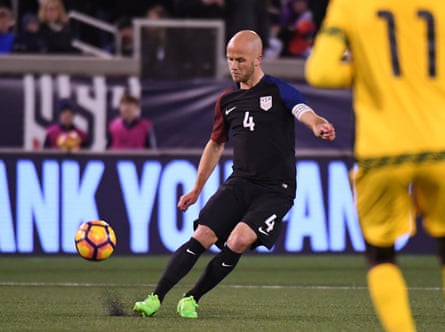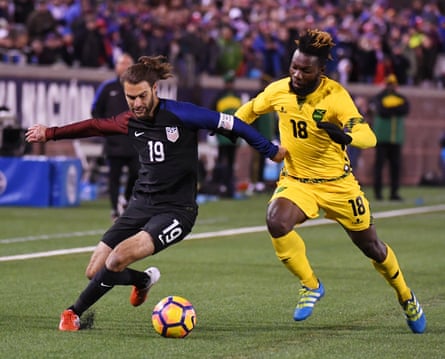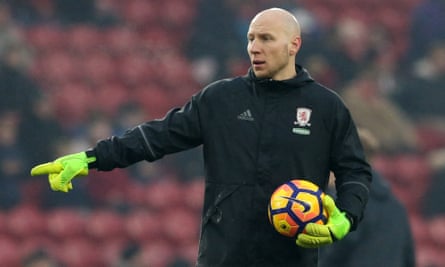How much should be read into the two January camp friendlies?
January team camps are MLS-dominated affairs that tend to be a mix of the experimental and a participation prize event. Players who’ve performed well for their clubs but have rarely featured for the national team get some recognition and some minutes – but that rarely turns into a platform for further time with the national team.
And then there are the young players being given a first taste of the international set-up, and who may fast-track their development. Gyasi Zardes was one such example, and if you believed the announcer team for the Jamaica game, Walker Zimmerman could be the next one.

Not so fast on the latter – Zimmerman did fine, but he may have to wait until the summer’s Gold Cup to see further competitive time. Even more seasoned fringe players will know that the Gold Cup is a realistic target, given the urgency of the USA’s World Cup qualifying predicament.
And that’s the flip side of these runarounds – Arena knows that those two games represented the sum total of his ability to speculate before a must-win game against Honduras in March. So the consistent system, limited experimentation, and increased emphasis on set pieces was a predictable part of his strategy since taking the job – it’s all about firefighting right now. The European-based players were not available, and Arena’s higher on MLS players than Jürgen Klinsmann was, so some novel roster selections were inevitable, but Arena’s mandate is for qualifying points, not performances.
Arena’s happy to be surprised, but it would always take a lot to sway his thinking. And frankly, never exactly being one to risk youth in an LA Galaxy shirt when there’s a veteran option, he’s hardly going to change his instincts when the national team face a series of cup finals.
Is 4-1-3-2 the answer?
In the second half of the Jamaica game it became a little clearer what the plan for Honduras might be, as Arena seemed to resist the urge to make major changes to the personnel or the shape – instead reintroducing likely starters such as Michael Bradley in a straight swap for Dax McCarty in the defensive midfield position of a 4-1-3-2.
For much of Klinsmann’s reign, the US lined up in a 4-2-3-1, but when the coach switched to one outright holding player during the Copa America Centenario, the results were immediate. That lesson is not lost on Arena as he contemplates qualifying games which, under normal circumstances, the US should be expected to dominate.
Of course, necessity is forcing Arena’s hand here. Jermaine Jones would normally play alongside Bradley in the deeper midfield position, but he’s suspended for the next game – and his absence creates the need to consider other possible formations.
Assuming Arena does go with 4-1-3-2, the principal individual keys here will be Michael Bradley being deployed in the straightforward No6 role he prefers, and Jozy Altidore presumably being paired with Bobby Wood up front, and hopefully having less heavy lifting to do on his own.
There are still questions there – specifically who plays in the No10 role. With Clint Dempsey almost definitely ruled out, the vision of Sacha Kljestan, or the Dempsey-esque cheek of Benny Feilhaber might be the option (with Kljestan’s affinity for the players around him probably making him the marginal favorite over the more mercurial Feilhaber).
That said, the notional playmaker in this role will only be as good as the ability of the wide players playing off him, and the full-backs overlapping. Against Jamaica, the overlapping was dutiful and diligent, but the US still looked to be struggling to break down bunkered opposition until McCarty’s ball from deep split a tiring defense and allowed Feilhaber and Morris to combine for the winner.
But if everyone plays their role to their proactive best, the formation has the potential to keep the US on the front foot against Concacaf competition. And right now, that’s the only consideration for a coach who doesn’t have to win any style points or make any grand claims about the direction of the team.
Is there mileage in the Graham Zusi experiment?
It was hardly free jazz, but Arena’s experimentation centered around his extended look at Graham Zusi as a converted right-back. Even that move was not so radical as it might look – it’s actually been a pet tactic for Arena over the years, to convert wide attackers to full-backs. Most recently he did so with Robbie Rogers at LA Galaxy, but it was also a feature of his first stint as US coach.
Zusi was solid enough, though he’s clearly learning on the job, and when the likes of DeAndre Yedlin return to the team in March, you can’t see Arena taking a chance on Zusi. Especially when you have more experienced options like Eric Lichaj to call on.

So why do it at all? Well, Zusi’s nothing if not a utility player, and there’s a possibility that Arena wants to give him minutes so that he can deputize late in the game, when all subs have been used, or there’s a red card to rearrange around. Or perhaps Arena remains unconvinced about Yedlin’s crossing: an overlapping Zusi has something intriguing to offer as the US seek to open up defensively minded Concacaf teams.
It’s possible Arena will persist in looking at this role for Zusi, but surely not in a must-win qualifier.
Who made a case to break into the team?
Let’s start by looking at an obvious highlight – the goal the US scored against Jamaica. From the ball Dax McCarty neatly picked forward to initiate the move, to Benny Feilhaber’s flicks and turns in tight space to set up Jordan Morris, to Morris himself finishing coolly – there’s a trio of players exemplifying what their coach wants from them.
But if you widen the analysis, McCarty had his pocket picked a couple of times, and was neat rather than decisive, while Morris was making amends for a missed chance in the first half. Morris will be a likely backup for Bobby Wood in March, but McCarty (who’s had an action-packed few weeks back in the national team — during which he got married and was traded from New York Red Bulls to Chicago Fire) may have to wait for another chance. At least he’s likely to get another chance under the new regime.
Feilhaber’s an interesting call, though – frozen out under Klinsmann, Feilhaber not only has a chance at redemption under Arena, but is the type of player the new coach appreciates for his willingness to try and express himself in advanced positions. He may well have done enough to earn a backup spot for the qualifiers.
Perhaps the most convincing case for inclusion was made by Sebastian Lletget. Lletget has the added advantage of being a well-known quantity for Arena, having been coached by him at LA Galaxy, but it’s the fact that he appeared like an instantly credible two-way option at this level that worked most in his favor. Even with the more obvious options of Fabian Johnson and Christian Pulisic, you’d have to think Lletget has done enough to make himself a solid roster member for the qualifiers.
Darlington Nagbe is likely to thrive with the visible trust placed in him. He’s the type of player who needs explicit encouragement to do what he does best – and never quite ignited under the sink-or-swim conditions Klinsmann believed in. Arena may not start him against Honduras or Panama, but he’ll believe he can make a difference.
That leaves defense, and after the Zusi discussion, and assuming Zimmerman’s more one for the future, then Jorge Villafana’s the most intriguing possibility. Villafana may be out of favor at his club team in Mexico, but his steady trajectory since his unusual entry into MLS via a TV talent competition has clearly stuck in Arena’s mind. And with the left back position a perennial problem for the US, Villafana may have at least earned another look. If not, there’s always DaMarcus Beasley …
Should Brad Guzan be trusted in goal?
The most stable position in the US line-up has suddenly become a headache. First there was Tim Howard picking up a long-term injury during the MLS playoffs in November, and then there’s been the worrying drift in fortunes of Brad Guzan, now seeing out his contract with Middlesbrough on the bench, as he awaits his summer transfer to Atlanta.
Guzan and Howard have been trading the goalkeeping slot for some time now, especially since Howard’s sabbatical removed his status as an automatic starter under Klinsmann.

Guzan hasn’t exactly taken a sabbatical, but he’s effectively had a question mark against his name for the best part of a year, since Aston Villa started their abject slide to relegation. Middlesbrough initially seemed to offer a Premier League lifeline, but Guzan soon lost his starting spot. With his Atlanta move, he’ll hope for and expect a similar uptick in fortunes as Howard enjoyed after his MLS move last summer, but that’s in July. Arena needs a starting goalkeeper right now.
Of the January camp options, Nick Rimando, Luis Robles and David Bingham were not sufficiently tested by tepid opposition, to make a convincing case for themselves. Rimando had a smart save late in the Serbia game, though like McCarty’s pass in the build up to the Jamaica goal, it was an important and recognizable contribution rather than a transcendent one.
More pertinently, Rimando and Robles are shot-stoppers rather than commanding box presences in the mould of Howard or Guzan. And both will be early in their respective seasons. When that factor is added in to the calculations on replacing a rusty Guzan, Arena, as he is likely to do with every major decision, will probably stick with what he knows.

Comments (…)
Sign in or create your Guardian account to join the discussion